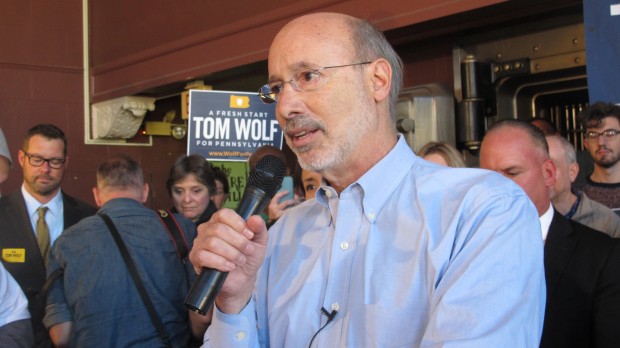While pushing gas tax, Wolf vague on how much money would stay local
-
Marie Cusick
At a campaign stop in Harrisburg Friday, Democratic gubernatorial candidate Tom Wolf repeated his pledge to enact a new tax on Pennsylvania’s natural gas production.
“I want to put a five percent severance tax on that gas,” he told a crowd of supporters. “And do it responsibly, from an environmental point of view.”
Gas companies are currently required to pay an impact fee for each well. In the past three years, the fees have generated more than $630 million. Most of the money is sent back to the local communities that host drilling.
Wolf, a York County businessman, says at current production levels his gas tax could generate $1 billion per year.
“This would take the place of the impact fee,” he explains. “It would include a big chunk to make sure the localities had money coming back to them.”
When asked by StateImpact Pennsylvania what constitutes “a big chunk,” he wasn’t sure.
“Down to the specific penny? I don’t have that,” he said.
Wolf wants to spend the rest of the tax revenue on increased drilling oversight at the state Department of Environmental Protection and investments in renewable energy and public education. He has a wide lead in the polls against incumbent Governor Tom Corbett.
Local elected officials from both parties worry about losing that impact fee revenue if Pennsylvania enacts a new gas tax.
“I certainly believe there should be some specificity [from Wolf],” says Bradford County Commissioner Daryl Miller, a Republican. “Going around making campaign speeches is one thing. We have to live with the consequences.”
Heavy drilling can lead to increased demands for road maintenance and repair, emergency preparedness, and housing. Bradford County is one of the most drilled on areas of Pennsylvania. Last year it received about $7 million in impact fees– more than any other county.
Shirl Barnhart is a Democratic supervisor for Morgan Township, in Greene County. In 2013, his municipality received $558,868 from impact fees. Speaking at a gas industry conference in Pittsburgh last month, Barnhardt said he’s concerned about what would happen to that money if Wolf is elected.
“The money is being best spent in the communities that are impacted,” he said. “People are learning to accept the industry and the municipalities are working better with the companies.”

















